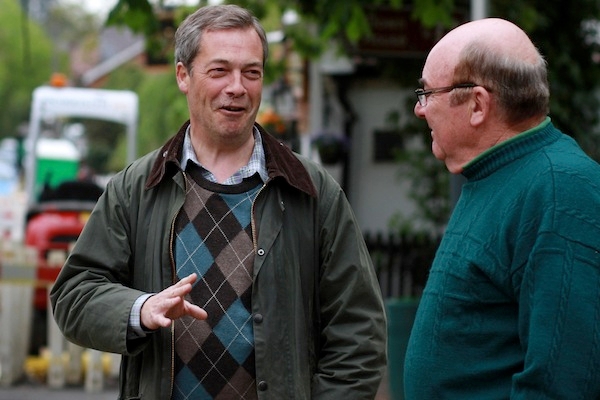- The Worcester rally’s popularity… My plan was to sneak in half an hour early for the 7pm rally, but by 6.30pm seats were taken and an overflow room was being hastily arranged, with seats gathered around a loudspeaker.
 By 6.50pm even these seats had been taken. The picture, right, is the overflow room, which Farage addressed separately speaking Evita-style from the balcony. He spoke about immigration a lot, but made a point of welcoming skilled immigrants of any creed or colour: to do so is the British way, he said. Welcoming unskilled immigrants at a time of mass youth unemployment is madness. There was much agreement on this point.
By 6.50pm even these seats had been taken. The picture, right, is the overflow room, which Farage addressed separately speaking Evita-style from the balcony. He spoke about immigration a lot, but made a point of welcoming skilled immigrants of any creed or colour: to do so is the British way, he said. Welcoming unskilled immigrants at a time of mass youth unemployment is madness. There was much agreement on this point. - …and the mix of its audience. What struck me most was the mix of people. Young couples, a single guy who’d come along because he thought it’d be better than “a night of EastEnders”. Not a political obsessive, but a fairly ordinary voter who, for whatever reason, had his interest pricked and wanted to attend a rally. That doesn’t happen much in Britain. Farage is on to something and it goes beyond Europe.
- Farage’s language is crude, but he’d argue that Thatcher’s was too. The Lady was also criticised for direct language, which sounded coarse to the ear of her Cabinet colleagues. But it worked. When she spoke about the threat of immigrants “swamping” Britain, it killed support for the National Front because so many of its target voters felt that, finally, a mainstream politician felt their concern. In no way say Farage or UKIP are the heirs to Thatcher, but as we look back on The Lady’s effect this week we ought to remember that she did her best to use the same language as her core voters.
 She’d read voters’ letters, not just to see what people said but to see how they said it. And where she encountered Westminster jargon – words like ‘resile’ etc – she’s cross them out. The above sample, unearthed by Philip Cowley from the archives, shows her deleting a whole chunk of text about animal welfare. The question marks show her disdain for one of her bugbears: politicians taking up a pet subject that makes them sound as if their priorities are not aligned to those of the average voter. This is where Farage sees his opportunity: he is trying to repeat her trick, in adjusting to the wavelength of the C2 voters when the Westminster parties are too posh to do so.
She’d read voters’ letters, not just to see what people said but to see how they said it. And where she encountered Westminster jargon – words like ‘resile’ etc – she’s cross them out. The above sample, unearthed by Philip Cowley from the archives, shows her deleting a whole chunk of text about animal welfare. The question marks show her disdain for one of her bugbears: politicians taking up a pet subject that makes them sound as if their priorities are not aligned to those of the average voter. This is where Farage sees his opportunity: he is trying to repeat her trick, in adjusting to the wavelength of the C2 voters when the Westminster parties are too posh to do so. - The scream of the forgotten voter. Voting technology now persuades Westminster parties that they can target the swing voters in the swing seats: the golden 4 per cent that can decide British elections.
 They think they know the names, addresses and concerns of this group – so the system almost obliges Westminster parties to shape their whole politics around this tiny sliver of the electorate. This leaves a great many people feeling, correctly, that they have been abandoned. In 2006, Peter Oborne wrote (right) about the opportunity this creates for the BNP. They have fallen apart: Farage, now, thinks he has an opportunity. And, frankly, good for him. If these parties knock on the doors of people who never hear from Westminster groups, they richly deserve the votes. That’s what democracy is all about.
They think they know the names, addresses and concerns of this group – so the system almost obliges Westminster parties to shape their whole politics around this tiny sliver of the electorate. This leaves a great many people feeling, correctly, that they have been abandoned. In 2006, Peter Oborne wrote (right) about the opportunity this creates for the BNP. They have fallen apart: Farage, now, thinks he has an opportunity. And, frankly, good for him. If these parties knock on the doors of people who never hear from Westminster groups, they richly deserve the votes. That’s what democracy is all about. - The Tories see what Farage is up to, and worry about their blue collar support. Eastleigh is not a posh part of Britain, and UKIP did better than the Tories. Why? At the Victory 2015 conference hosted by ConservativeHome there was an excellent session on blue collar workers, or the ‘working class’ vote, and how to appeal to it. It was the kind of session you would not have at the official Conservative Party conference because the leadership are deeply uncomfortable with the premise: that the Tories are too posh to understand the concerns and contingencies of those on the breadline.
- Ed Miliband is also worried about the Labour Party’s poshness. He has twigged that the focus on women MPs has tended to mean more posh people, but in skirts as well as suits. At the last Labour conference he had this to say:
His party is worried, and it’s quite funny to see our political class adopting Mockney twangs or fake Estuary English overtones. Labour is mooting all-working class shortlists – but this won’t work. 7. Sorry, Ed, the British voters are not bigots. MPs may see Britain through the columns of spreadsheets, in columns marked ‘gay’ ‘black’ ‘poor’ etc. But voters don’t see MPs that way. A brilliant paper by Philip Cowley (pdf) explains why this is ready. When asked, the women voters want the same as the gay voters and the black voters: an MP who shares their view. On a scale of 0-10, most of voters give zero to sexuality, gender and ethnicity. Here’s the key table from his research, a depressing read for parties who have put so much effort into attracting female MPs:-“We are right to say we need more women and we need 50 per cent of our MPs being women in my view, that is the only way we can be a truly representative country. We need to be more diverse in terms of ethnic diversity. But it must also be more diverse in terms of class background “
 Votes really aren’t fussed. Locality matters, politics matters – but class is pretty low as a concern.It’s what you say that matters – not whether you say it in a fake Jamie Oliver accent. The great irony of the Tory A-List is that it this nominally superficial exercise attracted a brilliant calibre of Tory radicals – their race, gender and sexuality is regarded as irrelevant by voters.
Votes really aren’t fussed. Locality matters, politics matters – but class is pretty low as a concern.It’s what you say that matters – not whether you say it in a fake Jamie Oliver accent. The great irony of the Tory A-List is that it this nominally superficial exercise attracted a brilliant calibre of Tory radicals – their race, gender and sexuality is regarded as irrelevant by voters.







Comments